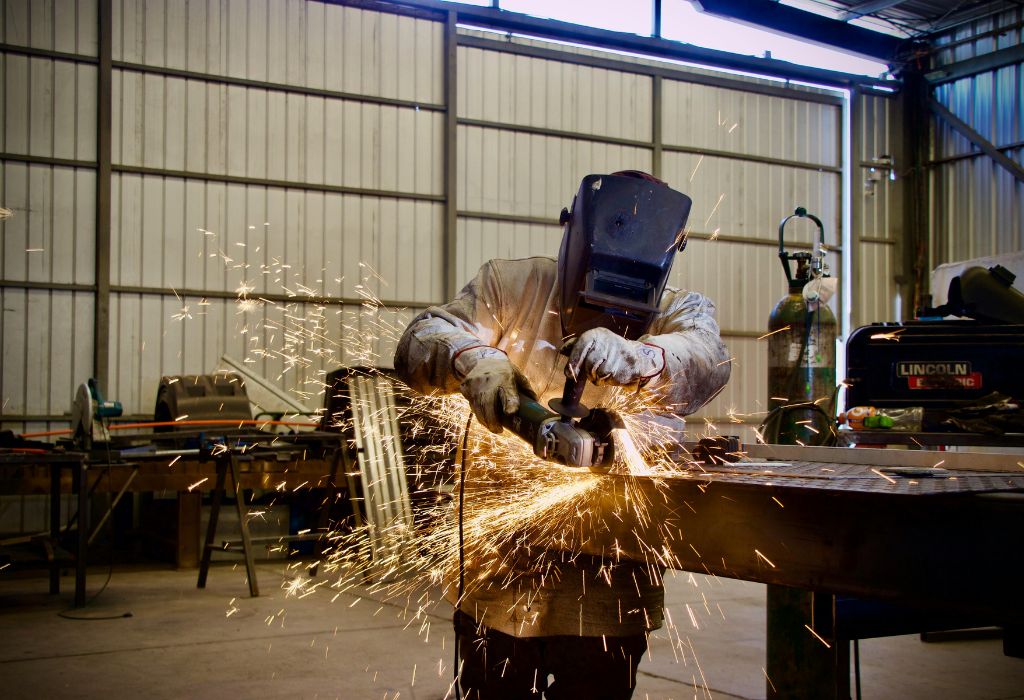The first sparks fly on a busy construction site as welders fuse steel beams high above the ground.
Their work ensures bridges, buildings, and industrial plants remain safe and stable. But a common question echoes across the trade: how much does a construction welder make today?
For new welders stepping into the field, pay expectations can be unclear. Some hear stories of big checks on industrial projects, while others see lower rates in residential or local jobs.
The truth is that salary varies widely depending on region, industry, and skill level.
According to the U.S. Bureau of Labor Statistics, the median wage for welders, cutters, solderers, and brazers was around $48,940 in 2023 .
In certain construction sectors, especially large-scale infrastructure and energy projects, earnings can climb far higher with overtime, per diem, and certifications.
Understanding what drives these numbers helps workers make smarter career moves.
Whether it’s traveling to high-demand regions, adding valuable welding codes, or joining a union, there are proven strategies to boost take-home pay.
This article breaks down the details, answering the key question: how much does a construction welder make, and what can you do to maximize earnings in 2025?
How Much Does a Construction Welder Make Today?

The salary of a construction welder is shaped by multiple factors, but on average, most earn between $40,000 and $65,000 annually in the United States. Entry-level welders on smaller projects may start near the lower end, while experienced professionals on industrial or union jobs often exceed the upper range.
The median wage for welders overall sits at $48,940 per year, but construction welders typically earn slightly higher due to the complexity of their work. Projects such as high-rise buildings, pipelines, and bridges demand advanced skills and certifications, raising wages above general welding averages.
Union membership has a noticeable effect on earnings. Union welders often secure stronger contracts, consistent overtime pay, and benefits like healthcare and pensions. Non-union welders may experience more fluctuation in hourly wages and fewer long-term benefits.
When considering how much does a construction welder make, it’s essential to factor in overtime, per diem for travel, and hazard pay. In peak construction seasons, skilled welders can push their annual earnings into the $80,000–$100,000+ range.
What is the average construction welder salary in 2025?
Between $40,000 and $65,000 annually.
Do union welders make more money?
Yes, union welders earn higher wages and receive stronger benefits.
Can welders earn six figures?
Yes, welders on large projects with overtime can exceed $100,000.
What is the median welder wage overall?
About $48,940 annually, according to BLS.
Does location impact pay?
Yes, welders in high-demand regions or cities earn more.
Factors That Influence Construction Welder Pay
Several key elements determine how much a construction welder earns. The first is experience. New welders with minimal certifications usually start near the base wage, while seasoned welders with multiple welding codes can command premium rates.
Industry sector also matters. Welders working on bridges, skyscrapers, or energy plants often make more than those on smaller residential projects. Heavy infrastructure and oil and gas construction projects consistently pay higher wages.
Geographic location is another factor. Welders in high-cost-of-living areas or booming construction hubs like Texas, California, and New York often earn higher hourly wages. Conversely, welders in rural areas or regions with lower demand may earn less.
Lastly, union membership can be a game-changer. Union welders not only earn more but also benefit from steady contracts, better benefits, and stronger job protections, which lead to higher lifetime earnings.
What factors affect construction welder pay most?
Experience, industry sector, location, and union membership.
Do welders in big cities earn more?
Yes, urban welders typically earn higher due to demand and living costs.
Does industry type matter?
Yes, heavy construction and energy sectors pay higher rates.
How much does experience influence pay?
Experienced welders can earn 20–30% more than entry-level workers.
Do unions guarantee higher wages?
Generally yes, unions provide stronger contracts and benefits.
Entry-Level vs. Experienced Construction Welders
New welders entering the field can expect wages on the lower end of the scale, typically $17–$22 per hour. These roles often involve basic tasks like fitting, tacking, and assisting senior welders. Over time, with skill development, pay can rise substantially.
Experienced welders, especially those with certifications like AWS D1.1 Structural Welding or pipe welding codes, can earn $28–$40 per hour or more. Their skills are in higher demand for precision welds on structural steel, pipelines, and pressure vessels.
Supervisory or foreman positions represent another level of opportunity. With leadership experience, welders can transition into management roles, often earning salaries beyond $80,000 annually.
Therefore, the gap between entry-level and experienced welders highlights the importance of investing in certifications, skill-building, and industry networking.
How much do entry-level welders make?
Around $17–$22 per hour.
What about experienced welders?
They can earn $28–$40 per hour or more.
Do certifications boost pay?
Yes, welding codes lead to higher wages.
Can welders move into management?
Yes, foreman or supervisor roles pay $80,000+.
How fast can wages increase?
Pay rises quickly with skills, certifications, and experience.
Regional Pay Differences in the U.S.

Location heavily influences how much does a construction welder make. States with strong construction markets or large-scale infrastructure projects pay the most.
For example, welders in Texas, California, and Alaska often see higher wages due to demand in oil, gas, and heavy industry. Alaska in particular pays well because of remote job locations and harsh conditions.
Meanwhile, welders in the Midwest or South may see slightly lower pay, though opportunities still exist in industrial plants, shipyards, and infrastructure projects. Cost of living often balances out these regional pay scales.
Traveling welders who move from state to state for projects often earn more through per diem pay, housing allowances, and overtime opportunities.
Which states pay welders the most?
Texas, California, and Alaska.
Why do Alaska welders earn more?
Remote work and extreme conditions raise wages.
Is pay lower in rural areas?
Yes, though cost of living may be cheaper.
Do traveling welders earn more?
Yes, per diem and overtime boost income.
Does union presence vary by region?
Yes, regions with stronger unions often pay more.
Union vs. Non-Union Construction Welders
Union welders consistently earn more than non-union counterparts. They benefit from collective bargaining agreements that set strong hourly rates, guaranteed overtime, and comprehensive benefits.
Non-union welders may earn less but sometimes enjoy greater flexibility in job choices. However, they often lack the security and protections unions provide.
Union contracts often include health insurance, retirement contributions, and consistent raises. Over a career, these benefits can make a significant financial difference.
For many welders, joining a union is a direct path to higher wages and better long-term stability.
Do union welders make more money?
Yes, typically 15–30% more.
What extra benefits do unions provide?
Healthcare, pensions, and overtime guarantees.
Are non-union jobs riskier?
They can be less secure, with variable pay.
Do unions negotiate raises?
Yes, unions ensure scheduled pay increases.
Can non-union welders earn well?
Yes, but usually with less stability and fewer benefits.
Certifications That Boost Construction Welder Pay
Certifications are one of the fastest ways to increase earnings. Employers often pay a premium for welders certified in advanced codes or difficult processes.
The AWS D1.1 Structural Welding Code is one of the most common and valuable certifications. Pipe welding certifications, especially for high-pressure or X-ray tested welds, bring even higher wages.
Specialized certifications in stainless steel, aluminum, or underwater welding also push salaries upward. Each credential demonstrates advanced skills that employers are willing to pay more for.
Continuous training ensures welders remain competitive in an industry where technology and standards evolve quickly.
Which certification pays the most?
Pipe welding and high-pressure certifications.
Is AWS D1.1 valuable?
Yes, it’s essential for structural welders.
Do aluminum and stainless steel codes help?
Yes, they expand job opportunities and pay.
How do certifications affect salary?
They can raise pay by 10–30%.
Do employers require certifications?
Often yes, especially on large projects.
Career Growth and Future Outlook

The demand for skilled welders remains strong in construction. Infrastructure investment in bridges, highways, and energy facilities ensures long-term opportunities.
As older welders retire, younger workers will find more openings and the chance to move into higher-paying roles. Leadership positions like foreman, inspector, and supervisor will also be in demand.
Technology will influence the trade, but welding still requires skilled hands. Automated systems may assist, but certified welders will continue to be essential for quality control and precision.
For anyone asking how much does a construction welder make, the future looks promising, with wages expected to rise steadily as demand increases.
Is welding demand growing?
Yes, infrastructure investment fuels demand.
Will automation replace welders?
No, skilled welders remain essential.
Are retirement rates creating openings?
Yes, many senior welders are retiring.
What roles offer career growth?
Foreman, inspector, and supervisor positions.
Is the outlook positive for 2025?
Yes, wages and opportunities are rising.
Conclusion
So, how much does a construction welder make? The answer depends on skill, certifications, location, and industry. While the average sits around $40,000–$65,000 annually, many welders push beyond $80,000–$100,000 with the right opportunities.
Union membership, specialized certifications, and willingness to travel all contribute to higher earnings. For those serious about maximizing pay, investing in training and pursuing high-demand sectors is the key.
Construction welding offers not just stable work but also the potential for a lucrative, long-term career. With infrastructure projects booming, 2025 presents welders with more opportunities than ever to raise their earning potential.

I’m Darrell Julian, the founder, lead writer, and hands-on welding enthusiast behind ArcWeldingPro.com. With more than 15 years of real-world welding experience, I created this platform to share what I’ve learned in the field, in the shop, and in the heat of the arc.


